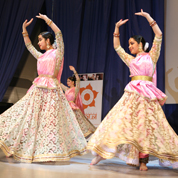Indian Diaspora celebrates the Holi Mela festival with pomp in Moscow
The representatives of the Moscow-based Indian business community and the entire members of the larger India Diaspora in Russia celebrated this year’s Holi Mela festival in such pomp and scale that briefly transformed the environs surrounding the event’s venue in southern Moscow into a typical Indian neighborhood, as both Indians and non-Indians — completely painted in all shades of the rainbow colors — dominated the district’s landscape on March 15.
Specifically, the events were graced by HE Prabhat P. Shukla, the Indian Ambassador to Russia, other members of the Diplomatic Corps, representatives of the Indian Business Alliance (IBA), Muscovites, other Russians and expats residing in Moscow and other parts of the country. According to the Indian traditions, the festival marks the arrival of spring, and the abundant use of colors symbolizes people’s harmony with nature, happiness, success and prosperity. This probably explained why Sammy Kotwani — the owner of the Imperial Tailoring Co., who also doubles as the president of the IBA, one of the event organizers — was painted from head to toes, completely turning his expensive bespoke suit into a unique combination of all rainbow colors. “Holi Mela is a festival of colors,” he noted. “Therefore, if you attend this festival and you are not painted in different colors, it means you are not celebrating Holi Mela as required, because everything on this day should be in colors.”
The festive mood surrounding the Holi Mela-2009 celebrations and, more particularly, the record number of invited guests, ordinary visitors and event participants, was further boosted by the organizers’ decision to hold nationwide Indian dance competitions in three different categories, Classical, Folk and Film 
Explaining the reasons for organizing the dance competitions, Kotwani said the Indian Diaspora’s strategic goal is to use such events as a means for compensating for the acute deficit of Indian cultural programs in Russia, where the Indian youth residing in the country and Russian fans of Indian traditions can professionally display their talents. “With this year’s fantastic success and with the expected support from the Diaspora and event sponsors, we hope to raise the level of these competitions and other activities every year, both in prize parameters and their social importance.”












 Web design,
Web design,